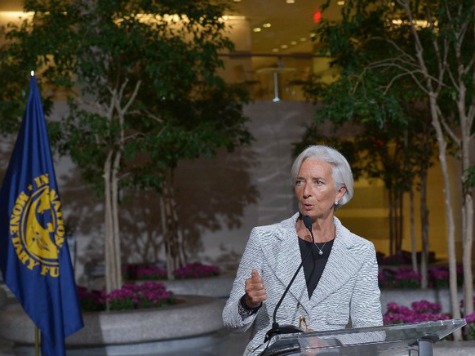Christine Lagarde, French International Monetary Fund (IMF) managing director, said in an interview with German newspaper Handelsblatt on May 12th that “Ukraine needs much more than 17 billion dollars” in the rescue package of financial assistance approved by the IMF on April 31. Despite earlier reassurances that Ukrainian assistance would be temporary, the IMF now expects Ukraine’s economy to shrink by 5% this year, while the global economy will grow by 3.6%.
Lagarde’s comments were related to what she considers to be positive news that Ukraine and the European Union were expected to have signed an agreement on May 13th for the extension of $1.9 billion of additional financial support for the country currently suffering from a Kremlin-backed separatist movement. But she emphasized the financial problems in the Ukraine will require combined financial support from many donors, “for example, bilateral help from abroad and financial help from other international financial institutions.”
The IMF now sees the ongoing crisis in Ukraine as a major risk for the global economy that was already experiencing substantial turbulence, which could spread to other emerging markets. “The crisis in Ukraine is a danger which is very difficult to gauge [and] whose contagion risk for other countries can barely be predicted.” Lagarde added, “It can have severe economic consequences.”
Tension in Ukraine has been a reason for significant volatility in financial markets. In a flight to safety, investors have started selling emerging market currencies, bonds, and equity. They are instead favoring assets in developed markets.
Asked where the biggest dangers reside, the IMF leader pointed out that the pro-Russian separatism turmoil in eastern Ukraine will have an impact on international trade, foreign direct investment, international capital flows, and Europe’s energy supply. Lagarde stated, “We can’t simply say the situation is too precarious, therefore we’re not giving money at the moment.”
Italy’s UniCredit bank CEO Federico Ghizzoni said a solution to the “tense and complicated” crisis in Ukraine is needed to avoid harming business in Europe. “I hope that at the end of the day common sense will prevail on both sides, in Ukraine but also in Russia versus Europe and the U.S.,” he said. “Diplomacy must work hard in order to find a solution.”
Mario Draghi, head of European Central Bank, shocked many economists during his May 8th news conference in Brussels when he said that Russia’s capital outflow reached almost $220 billion this year, though the Russian Central Bank reported only $50 billion for the first three months. He is concerned that tougher economic sanctions against Russia could cripple its economy. A trade embargo would heavily impact Russia’s export-oriented economy; 75% of the economy consists of oil and gas exports, and those revenues supply 50% of the national budget.
The author welcomes feedback and will respond to comments by readers.

COMMENTS
Please let us know if you're having issues with commenting.